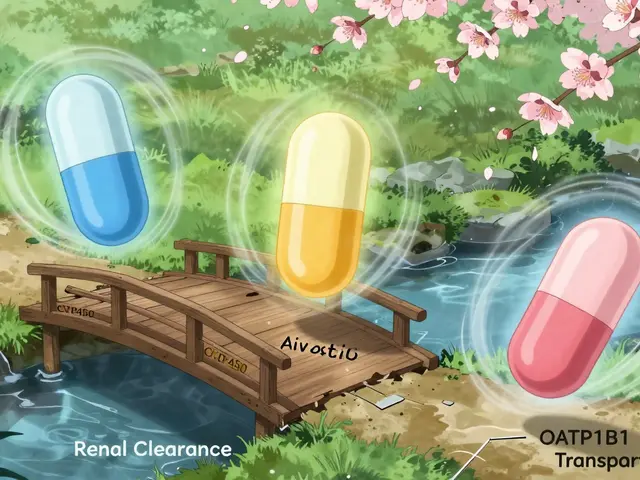Exploring the Anti-Inflammatory Properties of Colchicine
In recent years, the anti-inflammatory properties of colchicine, a drug traditionally used to treat gout, have become a subject of great interest among researchers and medical professionals. Colchicine works by inhibiting the assembly of microtubules, which play a crucial role in the inflammatory response. This action can potentially be beneficial in conditions that involve inflammation, such as arthritis, inflammatory bowel diseases, and even some skin disorders.
Not only does colchicine reduce inflammation, but it also has the potential to modulate the immune system. This means that it could be used to treat autoimmune diseases, where the body's immune system attacks its own cells. Although research in this area is still in its early stages, the potential for colchicine to provide relief for patients with these conditions is promising. Further studies are needed to fully understand the mechanisms underlying these effects and to develop new therapeutic strategies.
Colchicine in Cardiovascular Disease Management
Cardiovascular diseases are the leading cause of death worldwide, and inflammation plays a significant role in their development and progression. Due to its anti-inflammatory properties, colchicine has been proposed as a potential off-label treatment for various cardiovascular conditions. Research has shown that colchicine can reduce the risk of recurrent pericarditis, a condition characterized by inflammation of the lining surrounding the heart.
Additionally, studies have suggested that colchicine may reduce the risk of major adverse cardiovascular events, such as heart attacks and strokes, in patients with coronary artery disease. This is thought to be due to its ability to stabilize atherosclerotic plaques, which are the primary cause of these events. While more research is needed to confirm these findings, the potential of colchicine in cardiovascular disease management is certainly worth exploring.
Colchicine's Role in Cancer Treatment
Emerging evidence suggests that colchicine may have potential off-label uses in cancer treatment. Its ability to interfere with cell division by inhibiting microtubule assembly has led researchers to investigate its potential as an anti-cancer agent. Some studies have found that colchicine can induce cell death in cancer cells, while others have reported that it may inhibit tumor growth and metastasis.
However, the use of colchicine as a cancer treatment is not without challenges. Its narrow therapeutic index and potential for severe side effects, such as bone marrow suppression and liver toxicity, may limit its applicability in this context. Further research is needed to determine the optimal dosing and administration strategies for colchicine in cancer treatment, as well as to identify which types of cancer may be most responsive to this drug.
Fighting Viral Infections with Colchicine
There is growing interest in the potential off-label use of colchicine for the treatment of viral infections. Its immunomodulatory effects may be beneficial in controlling the excessive immune response that can occur during viral infections, such as in severe cases of the flu or COVID-19. By dampening the immune response, colchicine may help prevent the development of life-threatening complications like acute respiratory distress syndrome (ARDS) and multi-organ failure.
Additionally, some studies have suggested that colchicine may have direct antiviral effects, although the exact mechanisms are not yet fully understood. While more research is needed to establish the safety and efficacy of colchicine in treating viral infections, its potential as a novel antiviral therapy is an exciting area of exploration.
Colchicine as a Treatment for Liver Conditions
Recent studies have suggested that colchicine may have potential off-label uses in the treatment of certain liver conditions. For example, colchicine has been studied as a potential therapy for primary biliary cirrhosis, a chronic liver disease that leads to the destruction of bile ducts. In one study, colchicine treatment led to improvements in liver function tests and reduced the need for liver transplantation in some patients.
Other research has investigated the use of colchicine in the management of nonalcoholic fatty liver disease (NAFLD), a common liver disorder characterized by the accumulation of fat in liver cells. While the results of these studies have been mixed, there is some evidence to suggest that colchicine may improve liver function and reduce inflammation in patients with NAFLD. Further research is needed to confirm these findings and determine the optimal dosing and duration of treatment.
Uncovering New Potential Uses for Colchicine
As researchers continue to study colchicine and its various mechanisms of action, it is likely that new off-label uses for the drug will be discovered. For example, one area of ongoing research is the potential use of colchicine in the treatment of neurological disorders, such as Alzheimer's disease and multiple sclerosis.
As our understanding of the many ways in which colchicine can modulate cellular processes and the immune system grows, so too does the potential for this versatile drug to be used in a variety of medical conditions. It is important for researchers and clinicians to continue investigating the potential off-label uses of colchicine in order to provide patients with the most effective and innovative treatment options.







Gina Damiano
May 21, 2023 AT 07:37Side effects? Yeah, I get the occasional stomach upset, but I just take it with food and it's fine. People act like it's poison, but it's not. It's just a tool. Used right, it works.
Emily Duke
May 21, 2023 AT 09:14Stacey Whitaker
May 22, 2023 AT 13:32Still, I don't get why the pharma companies aren't pushing this harder. It's cheap. It's old. No patent. No profit.
Kayleigh Walton
May 23, 2023 AT 08:43Also, if you're considering it for NAFLD or viral inflammation, please work with a doctor. Not because it's dangerous, but because we need to tailor it. One size doesn't fit all, even with ancient remedies.
Stephen Tolero
May 24, 2023 AT 11:39Brooklyn Andrews
May 25, 2023 AT 21:06Joanne Haselden
May 26, 2023 AT 03:15That said, the risk-benefit profile must be carefully assessed in patients with renal impairment or concomitant CYP3A4/P-gp inhibitors. The narrow therapeutic index demands vigilance.
Vatsal Nathwani
May 26, 2023 AT 19:41Saloni Khobragade
May 26, 2023 AT 20:32